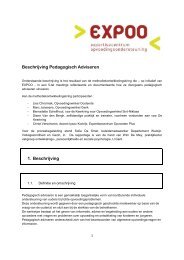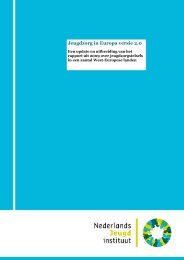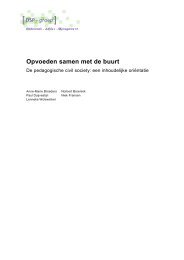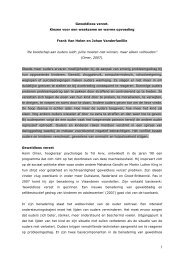operate at different levels. Some are to do with programmes themselves, some are to dowith the host site and some are to do with local service systems.Poor model fidelity caused by inappropriate changes to or the removal of corecomponents can lead to new implementations of model programmes being much lesseffective than in research trials. Cultural incongruence between programme values andlocal mores can generate dissatisfaction amongst participants. There may be a lack of fitbetween programme developer’s enthusiasms and those of the professionals charged withimplementing them, especially where they are expected to simply deliver from a manualwithout any opportunity to ask questions or make adaptations and programmes may nothave been designed to meet the needs of practitioners or have been marketed to helpsystems meet obligatory objectives at the same time as improving child well-being.Often grant funding will be available to initiate programmes but only on the assumptionthat the grant receiving body will work out how to sustain them. Many fizzle out beyondtheir seed funding. There may be lack of support for widespread implementation.Programmes may not provide the necessary support and information to enable their localimplementation teams to work effectively within regular service systems. Programmes maynot be easy to use, and if so they are destined to remain ‘boutiques’ on the margins ofservice systems. Local health, welfare, educational and/or social care systems are not alwaysready for programmes. For example, staff may lack the requisite skills, or there may be alack of common purpose in an organisation, or there might not be anyone available andsuitably qualified to offer technical support.Given how rare it is for untested or ineffective provision to be decommissioned, there maybe a lack of space or capacity for delivering a new programme. It is easier to let go of newand standalone programmes than it is to thin out well-established and inter-connectedservices that are not evidence-based.7.3. How to make programmes sustainableThese themes recur throughout this report, particularly those relating to ownership andcultural adaptation. Addressing them is essential to ensure parenting programmes get offthe ground successfully, make an early positive impact on their participants and arewelcomed by practitioners and the communities in which they work. This section, however,focuses more on practices that will specifically help sustain programmes beyond their seedfunding and enable them to be successfully integrated into ‘services as usual’.Our understanding of how to do this is hampered by the limited empirical research aboutwhat works. But the following have been identified as potential factors (Bumbarger &Perkins, 2008). First is the development of a sustainability plan early in the developmentprocess. Second is building an organisation’s infrastructure capacity, including policies,procedures and resources to ease implementation and the ultimate integration of theprogrammes activities into routine operations. Third is staff buy-in to the programme’stheory of change and values base. Sustainability is more likely if the programme has localchampions and if its purpose fits with the goals and mission of the implementingorganisational culture and the values of its leaders (Bates & Davis, 2010).Much of this speaks to the need to tap into services ‘systems’, including health, education,58 Professional Practice Board
child protection, social care and youth justice (Little, 2010). Why systems? Systems havelarge amounts of money; Birmingham City Council, for example, spends £1.3 billionannually, approximately £5,000 per child. Service systems reach many children andfamilies. Birmingham’s children’s services serve 260,000 children. Systems endure: they arenot here today, gone tomorrow. Arrangements established in the 19th century largelypersist today. They are sustained by engagement with a wide range of social institutionsincluding laws, funding streams, bureaucracies, the need to sustain the livelihoods of staff,a public service ethic, and so on. However, traditionally they don’t ‘do’ programmes.In recognition of this interdependency and to combat the long-term problem, someprogrammes have developed their own developmental approaches to gradual engagementwith the very diverse elements of the wider socio-political fabric that sustains our socialinstitutions. For example:Triple PTriple P is designed to be implemented as an entire integrated system at a population level. However,the multi-level nature of the programme enables various combinations of the intervention levels andmodalities within levels to be used flexibly as either universal, selective or indicated prevention ortargeted early intervention strategies depending on local priorities, staffing and budget constraints.Some communities using Triple P use the entire multi-level system, while others may focus on gettingone level of the programme implemented at a population level, while seeking funding support forother levels of intervention.To increase the likelihood of sustaining new programmes it is necessary to recognise thatthe functions of systems extend beyond improving child well-being. For example, they arealso involved in meeting society’s need for a healthy and educated workforce to contributeto the economy, giving parents time to work, punishing offenders, and so on. They musttake into account political demands, public opinion, consumer expectations and the needsof staff. They are set up to meet the needs of adults and society as much as children. Putanother way, systems have native processes that flow from the history, structures, values andbeliefs of children’s services (Little, 2010). To be ‘system-ready’, evidence-based parentingprogrammes need to know about these processes.‘System-readiness’ refers to whether a programme is accompanied by the necessary supportand information to enable its implementation in mainstream service systems. Are theinformation and resources to enable its successful implementation in a system readilyavailable? The most advanced programmes are ready for the way systems work, for examplefitting into a school curriculum or harmonising with the work of highly skilledpractitioners, such as social workers or psychologists.Since it is now established that programmes that are delivered with ‘fidelity’ to their modelachieve the best results, ‘system ready’ programmes have developed resources and activitiesthat promote fidelity. These include manuals, training materials, implementationprocedures and the supervision of implementation, technical support, pre-post evaluationof child outcomes and fidelity protocols or checklists. For example:SNAPWith adequate training and support, this model can be successfully replicated and implemented withhigh fidelity in a variety of settings. SNAP fits in the classroom, clinician’s office and home.<strong>Technique</strong> <strong>Is</strong> <strong>Not</strong> <strong>Enough</strong> 59
- Page 1 and 2:
Professional Practice BoardTechniqu
- Page 3:
ContentsAcknowledgements ..........
- Page 6 and 7:
We also wish to thank Sarah Fitzroy
- Page 8 and 9:
alienation and sense of isolation f
- Page 10 and 11: A range of these programmes are rec
- Page 12 and 13: 2. Vision and purpose2.1. The brief
- Page 14 and 15: From this conference a commitment t
- Page 16 and 17: development strategies have been us
- Page 18 and 19: 3. The socio-political context3.1.
- Page 20 and 21: Box 1: UNODC compilation of evidenc
- Page 22 and 23: cost-effective and it has caused so
- Page 24 and 25: Positive ActionPositive Action was
- Page 26 and 27: ■Programmes must have robust evid
- Page 28 and 29: These principles are based on our a
- Page 30 and 31: families who might benefit. This pr
- Page 32 and 33: providers and partner agencies were
- Page 34 and 35: Positive Parenting Programme (Tripl
- Page 36 and 37: multiple approaches that also inclu
- Page 38 and 39: need to learn English in their pare
- Page 40 and 41: Parenting programmes that work in m
- Page 42 and 43: 5. Principle 2. Cultural sensitivit
- Page 44 and 45: Positive ActionPositive Action faci
- Page 46 and 47: attitudes. Such attitudes can surfa
- Page 48 and 49: developed purely from a theory-driv
- Page 50 and 51: cultural heritages lecture at them.
- Page 52 and 53: having reciprocal relationships to
- Page 54 and 55: first started delivering the progra
- Page 56 and 57: Strengthening Families ProgramWhen
- Page 58 and 59: 7. Principle 4. Sustainability: Cre
- Page 62 and 63: Incredible YearsAnother component o
- Page 64 and 65: commissioners can have more confide
- Page 66 and 67: Incentives for achieving model fide
- Page 68 and 69: 8. A framework for ensuring that ev
- Page 70 and 71: 9. Next stepsEvidence-based parenti
- Page 72 and 73: 70 Professional Practice Board
- Page 74 and 75: 72 Professional Practice Board
- Page 76 and 77: ReferencesAlinsky, S.D. (1971). Rul
- Page 78 and 79: Davidson, G. & Campbell, J. (2007).
- Page 80 and 81: Heindrichs, N., Bertram, H., Kusche
- Page 82 and 83: McDonald, L., FitzRoy, S., Fuchs, I
- Page 84 and 85: Spoth, R., Redmond, C., Hockaday, C
- Page 86: The British Psychological SocietySt
















